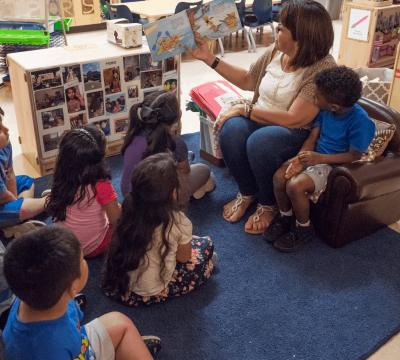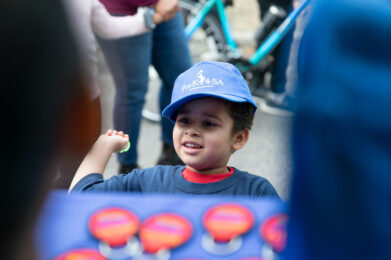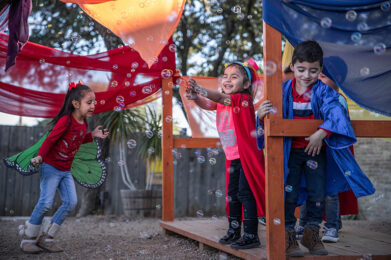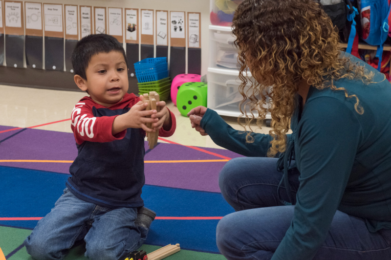Current Parents
Frequently Asked Questions
Click each item below to see our responses to some of the most common questions we receive from parents.

The Pre-K 4 SA curriculum is strategically designed to instill learning in every activity while the children play.They will learn concepts in math, science, engineering, art, and linguistics; social and emotional skills such as sharing, conflict resolution, and responsibility; and executive function skills, including planning, executing, and analyzing. They will not have homework; however, they will bring what they learn home.
Because meals and snacks are an integral part of the curriculum and some children who attend the center have food allergies, food from home is not permitted. For children with dietary restrictions, special meals are available. We work diligently with our certified nutritionist to plan healthy meals and snacks to fuel a child’s body and increase their comfort level with fresh, smart food choices.
Pre-K 4 SA provides a free Extended Day Program from 3-6 p.m. for families who are working or in school. To qualify, families must submit the “Extended Day Program Employment Verification” form during registration. This form must be signed by the parent’s supervisor. Forms must be submitted for both working parents, if applicable.
As required by law, Pre-K 4 SA uses RTI to support children who demonstrate a need for additional support in any of the following areas: language, learning, and behavior. As defined by NAEYC: “Response to intervention in EC may be seen as a means of providing high-quality teaching and responsive caregiving through the delivery of differentiated support for all young children. The RTI frameworks are means for implementing a hierarchy of support that is differentiated through a database decision-making process.”
Staff meets regularly to review data, plan for differentiated instruction, and monitor progress. Children will be referred for additional assessment with our partner districts when all interventions have been exhausted. If you suspect your child has a disability or he or she has been receiving services from a home healthcare provider or Early Childhood Intervention (ECI) program, parents should notify the Center Family Specialist. Pre-K 4 SA does not allow outside therapists to provide services at the Centers as a safety precaution for all children.
Each classroom has its own newsletter to keep parents informed on the subject matter being taught, activities children are doing, and any upcoming events. Parents may also contact teachers via email, phone, or Remind.
Pre-K 4 SA encourages home visits because the key to our assured future educational success is weaving educational concepts into the home environment and weaving the love and warmth of the home environment into the classroom. We are grateful that our families welcome us into their homes—these strong relationships will help your child thrive.
When you visit the classroom for Welcome Week, please bring the following supplies labeled with your child’s first and last name:
- Complete change of clothes including top, bottoms, underwear (training underwear, if needed), and socks
- Small blanket
- Small backpack
- Reusable water bottle
- 1 box of tissues (does not need to be labeled); each family will be asked to provide a second box in January.
We also recommend children wear comfortable clothes and tennis shoes/sneakers every day because they move, dance, and play as they learn.
Rest/nap time is essential to our daily routine for all children, even those who cannot sleep. Our experience has shown that with the amount of stimulation, interaction, and play during the day, the child’s bodies and brains are ready for the rest.
Our teachers are specially trained in conflict resolution. If a child is causing disruption in the classroom, the teacher will guide the child to change his/her behavior by asking questions, making suggestions, or giving options. If two children disagree, the teacher will get down on their level and guide them in working out a resolution by asking questions until they can reach a mutual resolution. The main goal of discipline is not to tell the child what to do but to enable them to think and come to a resolution on their own.
Pre-K 4 SA staff use developmentally appropriate practices to help children understand classroom routines and expectations. Staff positively guide children’s behavior and support children in developing self-awareness, self-direction, self-regulation, and prosocial behaviors.
Pre-K 4 SA staff use positive methods of guiding children’s behavior, including:
- Using descriptive words to acknowledge appropriate behavior instead of focusing on unacceptable behavior;
- Reminding a child of behavior expectations by using clear positive statements, visual aids, and modeling;
- Redirecting behavior using positive statements; and
- Seeking counseling or other professional support for a child who is facing challenges that are affecting his/her ability to be successful at school.
For the safety of our children, all Pre-K 4 SA centers and food vendors are strict shellfish and nut-free facilities.


